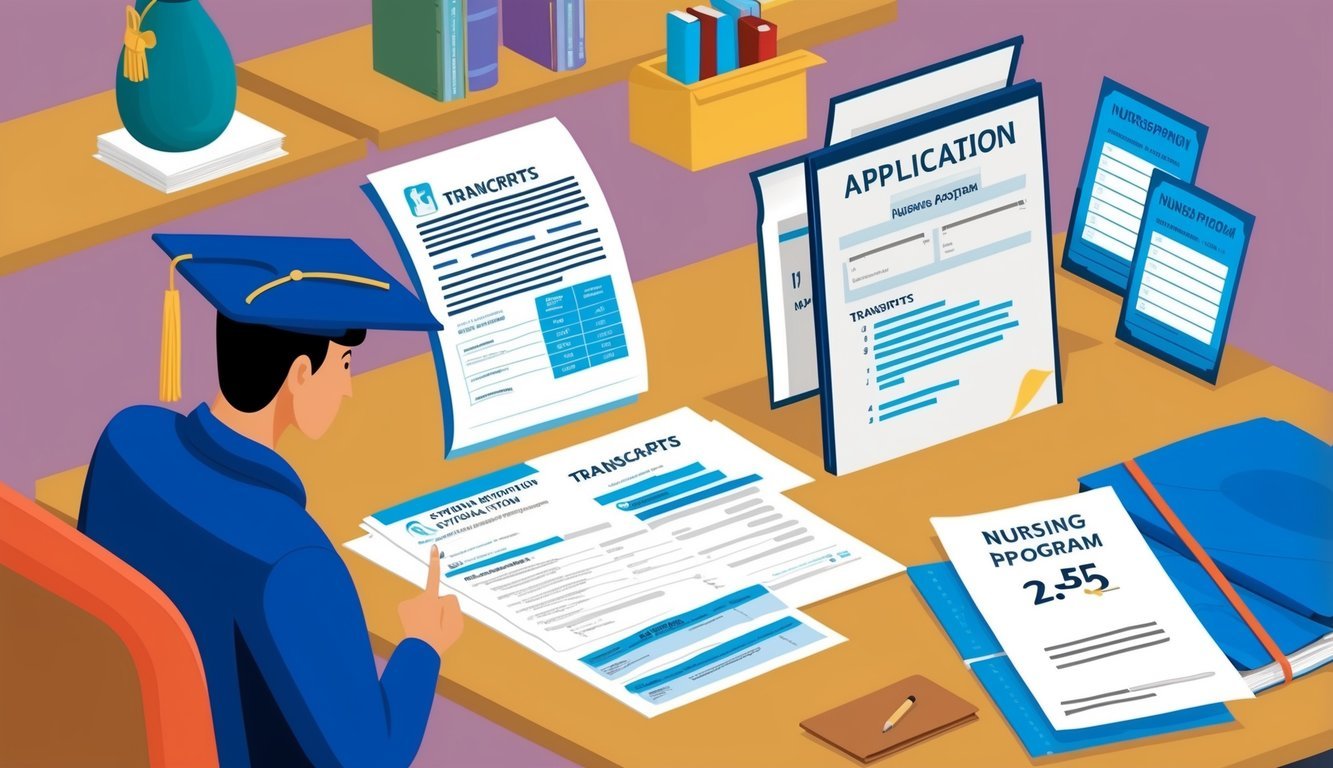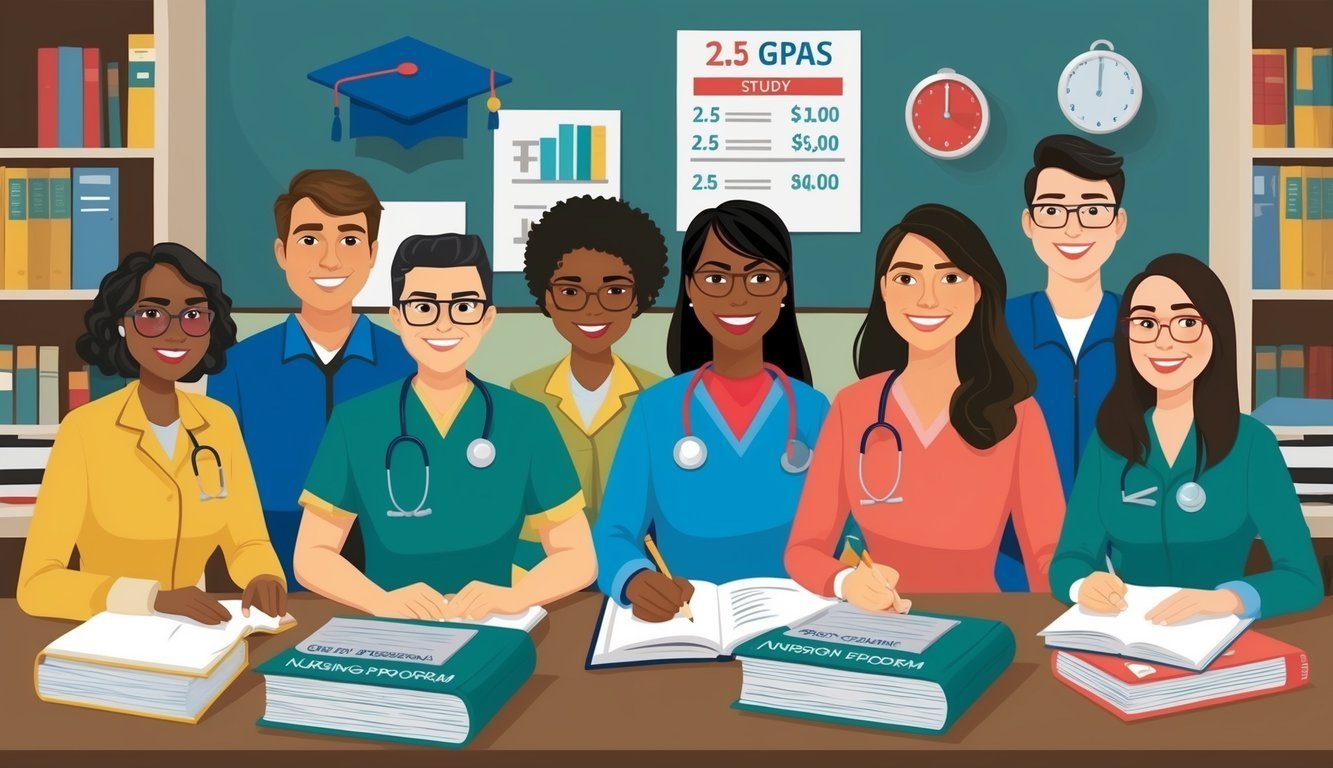Accelerated nursing programs with a 2.5 GPA requirement offer a great opportunity for those looking to enter the nursing field quickly and efficiently. These programs allow individuals with a lower academic GPA to pursue a fulfilling career in nursing.
If you already have a bachelor’s degree in another field, you can transition to nursing in a shorter timeframe than traditional programs.
In these programs, you can expect a rigorous curriculum that combines both classroom learning and hands-on clinical training.
This experience is vital as it prepares you for real-world nursing challenges.
Many institutions understand that your GPA may not reflect your potential, making these programs accessible to a wider range of applicants.
Exploring these options can lead to a rewarding career in nursing, where demand continues to grow.
With dedication and the right program, you can achieve your goal of becoming a registered nurse.
Key Takeaways
- Accelerated nursing programs accept students with a 2.5 GPA or higher.
- Most programs combine coursework with essential clinical experiences.
- Nursing careers are in demand, offering strong job prospects.
Understanding Accelerated Nursing Programs
Accelerated nursing programs offer a fast track to earning a Bachelor of Science in Nursing (BSN) for individuals who already hold a degree.
These programs help you transition into the nursing field quickly and with a solid educational foundation.
Below are key aspects you should consider.
Overview of Accelerated BSN Programs
Accelerated BSN programs are designed for those who have completed a bachelor’s degree in another field.
They typically last 12 to 18 months, allowing you to earn your BSN in a shorter time compared to traditional programs.
The curriculum covers essential nursing topics and includes clinical practice.
This hands-on experience is crucial for developing your skills.
Many programs also emphasize critical thinking and patient care, ensuring you are well-prepared for the nursing profession.
Eligibility Criteria and GPA Requirements
Most accelerated BSN programs require a minimum GPA of 2.5 for admission.
This standard helps ensure that you have the academic foundation necessary for the rigorous coursework ahead.
In addition to GPA, you may need to provide transcripts, letters of recommendation, and a statement of purpose.
Some schools also require standardized test scores like the GRE.
Meeting these criteria allows you to enter competitive programs that can influence your future career in nursing.
Importance of Accreditation
Choosing an accredited institution is vital for your education.
Programs accredited by organizations like the Commission on Collegiate Nursing Education (CCNE) and the Accreditation Commission for Education in Nursing (ACEN) are recognized for quality and standards.
Attending an accredited program ensures that your BSN degree is respected by employers and meets the requirements for taking the NCLEX-RN exam.
Without proper accreditation, your nursing credentials may not be valid, limiting your career options.
Always verify the accreditation status of the program you are considering.
Admission Process and Prerequisites

The admission process for accelerated nursing programs with a 2.5 GPA requirement typically involves specific application components and essential prerequisite coursework.
Understanding these factors can help streamline your path into nursing education.
Application Components
When applying to an accelerated nursing program, you usually need to submit several key components.
Common elements include:
- Application Form: Complete the form provided by the school.
- Transcripts: Submit official transcripts from all higher education institutions you attended.
- Personal Statement: Write about your motivation for pursuing nursing and your career goals.
- Letters of Recommendation: Obtain at least two letters from professors or professionals in healthcare.
- Resume/CV: Highlight relevant work or volunteer experience.
Some programs may also require an interview or entrance exam.
Make sure you carefully check the specific requirements for each school you are considering.
Prerequisite Coursework and Experience
Most accelerated nursing programs require certain prerequisite coursework.
Typical requirements include:
| Course | Description |
|---|---|
| Biology | Introductory or advanced biology courses |
| Chemistry | General chemistry with lab components |
| Anatomy and Physiology | A combined course or two separate courses |
| Psychology | Introduction to psychology or developmental psychology |
In addition to coursework, healthcare experience can be a significant asset.
Many programs appreciate applicants who have volunteer or professional experience in settings like hospitals or clinics.
This experience not only strengthens your application but also prepares you for the demands of nursing education.
You can find programs that fit your qualifications and needs by exploring resources such as Nursing Process.
Curriculum and Clinical Training
In accelerated nursing programs with a 2.5 GPA requirement, the curriculum combines intensive coursework with hands-on clinical training.
This balance prepares you for the demands of a nursing career, ensuring you grasp both theoretical knowledge and practical skills.
Coursework and Degree Requirements
You will find that nursing coursework includes essential subjects like anatomy, physiology, pharmacology, and evidence-based practice.
Each course is designed to build your understanding of healthcare and patient care.
When enrolled, you typically complete around 54 to 55 credits, as seen in programs such as the one offered by the University of Kentucky.
Required classes focus not only on foundational knowledge but also on specialized areas critical for nursing roles.
Some programs may additionally require you to complete prerequisites before admission, ensuring you are well-prepared.
Clinical Rotations and Hands-on Experience
Clinical rotations are a vital component of your training.
You will spend significant time in healthcare settings, applying your knowledge in real-world situations.
This experience allows you to work with patients under the guidance of experienced nurses.
During your clinical practice, you’ll rotate through various departments such as pediatrics, geriatrics, and emergency care.
Each rotation helps you develop different skills and gain insights into specific patient populations.
Programs ensure you meet the required hours of clinical training, often exceeding 700 hours, to ensure you graduate fully prepared.
Career Outlook and Advancement
The career outlook for registered nurses (RNs) who complete accelerated nursing programs with a 2.5 GPA requirement is promising.
You can expect a range of job opportunities and salary levels, along with various paths for continuing education and specialization.
Job Opportunities and Salary Expectations
As a registered nurse, you will find a variety of job opportunities in diverse settings such as hospitals, clinics, and outpatient care centers.
The job outlook for RNs is strong, with the Bureau of Labor Statistics projecting a growth rate of 6% from 2021 to 2031.
Here is a summary of average salaries for RNs:
| Location | Average Hourly Wage | Annual Salary |
|---|---|---|
| National Average | $36.22 | $75,330 |
| California | $53.70 | $111,696 |
| Texas | $32.09 | $66,735 |
These figures show that salaries can vary significantly based on location and healthcare setting.
In metropolitan areas, your earning potential as an RN increases, making it an attractive career choice.
Continuing Education and Specializations
Advancing your career often involves further education.
Many RNs choose to pursue a Master of Science in Nursing (MSN) or a Doctor of Nursing Practice (DNP).
These degrees can open doors to specialized roles such as nurse practitioners, clinical nurse specialists, or nurse educators.
Specializations can enhance your skill set, making you more competitive in the job market.
Some popular areas of focus include:
- Nurse Anesthesia
- Pediatric Nursing
- Gerontological Nursing
- Critical Care Nursing
Each specialty may require additional certifications and training, but they can lead to higher salaries and more responsibilities.
By continuing your education, you will increase your opportunities for advancement in the nursing profession.
Top Accelerated Nursing Programs
Choosing the right accelerated nursing program depends on your academic background, career goals, and personal circumstances.
Programs with a GPA requirement of 2.5 offer opportunities for many aspiring nurses.
Here are key factors to consider when selecting a program and notable schools that meet this requirement.
Selecting the Right Program for You
When selecting an accelerated nursing program, consider factors such as location, format, and support services.
Look for programs that offer online options for greater flexibility, especially if you are working.
Understand the tuition costs associated with each school.
Some institutions, like the University of Central Florida, have favorable tuition rates and provide extensive resources.
You may also want to check the school’s NCLEX pass rates, as high rates can indicate strong academic support.
Consider what clinical placements are offered, as these experiences are critical for hands-on learning.
Read reviews and talk to alumni to gain insights into their experiences.
Notable Schools with 2.5 GPA Requirements
Several accredited nursing schools accept students with a minimum GPA of 2.5.
Below are notable programs to consider:
| School Name | Program Length | Tuition Costs | Additional Notes |
|---|---|---|---|
| University of Central Florida | 12-16 months | $$ (Affordable) | Offers online coursework options. |
| Texas Tech University Health Sciences Center | 12 months | $$ | Strong clinical training facilities. |
| Eastern Kentucky University | 15 months | $$ | Small class sizes for personalized learning. |
Each of these schools provides a solid foundation for a Bachelor of Science in Nursing.
They prepare you to sit for the NCLEX and begin your nursing career effectively.
Research each program thoroughly to see which aligns best with your goals and needs.
Frequently Asked Questions

This section addresses important questions for students interested in accelerated nursing programs that accept a GPA of 2.5.
You will find specific information on admission requirements, state-specific options, and the possibilities for those with a lower GPA.
What are the admission requirements for accelerated nursing programs that accept a 2.5 GPA?
Admission criteria can vary by school, but many programs require the following:
- Bachelor’s degree: You typically need a non-nursing bachelor’s degree.
- GPA minimum: A 2.5 GPA is often the minimum, but some programs may weigh other factors more heavily.
- Prerequisite courses: You may need to complete specific science and nursing-related courses.
- Test scores: Some programs ask for standardized test scores, like the TEAS.
How does a 2.5 GPA impact eligibility for accelerated nursing programs in California?
In California, a GPA of 2.5 may allow you to apply to certain accelerated nursing programs.
Many schools maintain flexible admission policies.
You also need to demonstrate strong performance in prerequisite courses and other application components.
Are there any accelerated nursing programs in Texas that accept applicants with a 2.5 GPA?
Yes, some universities in Texas do accept a 2.5 GPA.
Options include programs that look holistically at your application.
Highlighting relevant experience and strong recommendation letters can bolster your chances of acceptance.
Can students with a low GPA still pursue accelerated nursing programs in New York?
Students with a 2.5 GPA can still find programs in New York.
Some schools offer community support or advising to enhance applications.
Contact admissions departments directly to discuss your specific case.
What are the options for accelerated nursing programs in Florida for students with a 2.5 GPA?
In Florida, several institutions may accept a 2.5 GPA.
These programs often have specific case-by-case evaluations.
Look for schools that emphasize a holistic review process when considering applicants.
Is it possible to enter an accelerated nursing program with a GPA lower than the typical minimum requirement?
Yes, some schools allow entry with a GPA lower than the usual minimum.
In these situations, you may need to showcase strong motivation through interviews, personal statements, or relevant experiences.
Each school has its policy, so it’s best to reach out to schools directly.

